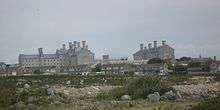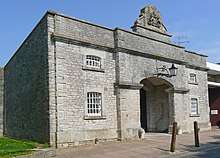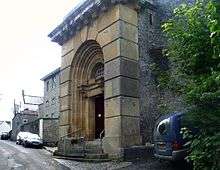HM Prison Portland
 | |
| Location | The Grove, Portland, Dorset |
|---|---|
| Security class | Young Offenders Institution |
| Population | 505 (as of June 2018) |
| Opened | 1848 |
| Managed by | HM Prison Services |
| Governor | Steve Hodson |
| Website | Portland at justice.gov.uk |
HM Prison Portland is a male Adult/Young Offenders Institution, located in the village of The Grove on the Isle of Portland, in Dorset, England. It is operated by Her Majesty's Prison Service. The prison was originally opened in 1848 as an adult convict establishment, before becoming a Borstal in 1921, and a YOI in 1988. In 2011 it became an Adult/Young Offenders establishment.
History
Portland's prison opened in 1848 for the holding of adult convicts. The purpose of a prison at Portland was largely to make use of convict labour in the construction of the breakwaters of Portland Harbour and its various defences.[1] The first convicts, totaling 64, arrived aboard the HM Steamer Driver on 21 November.[2] The Admiralty Quarries were developed for convicts to work in and once established, convict labour was providing 10,000 tons of stone per week for use on the breakwaters.[3] The conditions within both the prison and its quarries throughout the 19th-century would later help calls for penal reform in the UK, as many prisoners died while quarrying stone.[4]
From the moment of the prison's inception, the convicts became a tourist attraction.[5] The village of the Grove had been developed directly due to the prison, and a number of homeowners decided to open cafes from the upstairs of their houses for tourists to watch the convicts at work.[6] In 1869 the government announced that the prison, which was originally intended to be temporary, would become a permanent establishment. Although local residents petitioned against this,[7] it not deter the government's plans.[8] Between 1870-72, convicts constructed the now-redundant, Grade II* Listed St. Peter's Church just outside the prison.[9][10]
In 1921 the prison was converted into a Borstal.[11] Between 1931 and 1935, the Borstal Boys embarked on turning a disused convict quarry into a sports stadium, Grove Sports Stadium, at the back of St. Peter's Church.[12] During World War II, an air raid on 15 August 1940 saw the Borstal's Rodney House block bombed. This left four boys dead and others severely injured, including five being admitted to hospital.[13] In 1983, the Borstal changed to Youth Custody Centre.[14]
In 1988 the prison was re-rolled as a Young Offenders Institution (YOI, Portland), holding up to 519 young males aged 18 to 21. Accommodation at the prison was divided into seven blocks, Benbow, Raleigh, Drake, Nelson, Grenville, Collingwood, and Beaufort.[15] In 2009, the prison was the setting for Ian Wright's Football Behind Bars, a Sky1 reality TV series showcasing Wright's work to transform the lives of 24 serious young offenders. It was based on socializing the young men by organizing them in a football academy.[16][17]
In April 2011 the prison became an Adult/Young Offenders establishment.[18] In late 2013, it was announced that it would also be one of a number of resettlement prisons across the UK.[19] This news coincided with the recent decision to turn HM Prison The Verne, another prison on Portland, into an immigration removal centre. In 2010, with the assistance of the prison, a community project was completed to restore the Governor's Community Garden and open it to the public.[20] Around 2011, at the Verne, the Jailhouse Cafe was opened to the public, which was created to reduce re-offending and to offer prisoners work experience. When the Verne was converted to an Immigration Removal Centre in early 2014, the cafe has continued by using prisoners from the YOI.[21]
YOI Inspection reports
In March 2000, an inspection report by Her Majesty's Chief Inspector of Prisons severely criticised conditions at Portland YOI, including foul-smelling toilets and filthy showers. There were also complaints of rats in food service areas lodged by inmates.[22] Just over a month later, prison officials were forced to extract 26 prisoners who had for eight hours used furniture to barricade themselves away from their cells.[23]
In November 2004, a report from the Chief Inspector of Prisons highlighted racial tension, and distrust between Muslim inmates and staff at Portland Prison. The report also criticised the fact that inmates were still slopping out, because of poor sanitation facilities at the jail.[24]
A further report in June 2007 following an unannounced inspection heavily criticised conditions at Portland YOI. The report stated that some buildings "were unfit for purpose and lacked basic sanitation", with the continued practice of inmates without access to toilet facilities using buckets which they emptied through their windows.[25] The report criticized other elements of the prison, including opportunities provided to prisoners for physical activity and training, but indicated that the situation was better in Portland than it had been in 2004 at the time of the last inspection.
Grove Prison Museum
In late 2013, it was announced by local news that a museum would be opened to cover the history of HM Prison Portland. The Grove Prison Museum opened in March 2014,[26] through the work of retired officers John Hutton, Steve Ashford and Chris Hunt. The museum is based in the former deputy governor's residence, across the road from the main prison entrance. The idea for a museum had dated back over 20 years, when it was agreed to store some prison memorabilia items for a possible future museum. These were left untouched for 20 years in storage.[26]
South Dorset MP Richard Drax visited the deputy governor's building to officially open the prison museum and the Lighthouse Learning Centre.[27][28] A year after the museum's opening, it was announced that over 1000 visitors had been to the museum.[29]
Grade listed features

Various features of the prison have since become Grade Listed.
In September 1978, the gatehouse, including the attached VR Letter Box, became Grade II Listed.[30] In May 1993, both the east and west cell blocks became Grade II Listed.[31][32] At the same time, the E Hall, a prison cell block with attached punishment block from 1848, became Grade II Listed.[33] The Overseer's Hut with inclines became Grade II Listed in May 1993.[34]
One of the prison and village's most notable features is a high wall running along the village's main road, Grove Road. This boundary wall remains a significant visual element within the village, and was built in the 19th century to enclose the convict quarry workings. The boundary wall has been Grade II Listed since May 1993.[35] The sentry box, along with the gate pier became Grade II Listed in September 1978.[36] The boundary wall, and gate piers, running from St Peter's Vicarage to Alma Terrace, and dating from 1875, was Grade II Listed at the same time as the sentry box.[37] The early 19th century gate piers at the junction with Grove Road, along with the boundary walls to Ivybank and the Vicarage became Grade II Listed at this same time too.[38] In May 1993, the boundary wall west of the prison became Grade II Listed, and this section dates from 1848.[39] The prison's north and east boundary walls have been Grade II Listed since May 1993 as well, dating from 1848 and later.[40]
Alma Terrace, on Grove Road is a terrace of houses, built in 1854, originally as six large houses for prison wardens, was designated Grade II in September 1978.[41] The wash houses and connecting boundary wall to the rear of the terrace has also become Grade II Listed in May 1993.[42] The Governor's House (102 Grove Road), with its front boundary wall, has been Grade II Listed since May 1993. The detached house was formerly the Governor's House to the prison, built around 1850.[43] Additionally the prison itself has various Grade Listed features. The adjoining School House of Grove Infant School, along with the rear boundary wall, became Grade II Listed at the same time.[44]
Grove Lime Kiln lies approximately 320 metres north-west of St Peter's Church. The Grade Listed II structure was designated in January 2009.[45] Still owned by the prison service, the lime kiln remains in a derelict and uncared for state. It was built and once operated by convicts from the prison, and is an important survival and one of the last vestiges of lime production in Portland.[45] At the top of the nearby, private incline road is the abandoned Old Engine Shed that once served the cable-operated inclined railway that ran to Castletown through the Navy Dockyard that is now Portland Port.[46][47] The shed has been Grade II Listed since January 2001.[48]
Notable former inmates
References
- ↑ Legg, D. R. G. (2000). Portland Prison Illustrated. Sprint Signs and Graphics, Weymouth. p. 5.
- ↑ "Verne Prison information". Justice.gov.uk. Retrieved 6 June 2014.
- ↑ "Isle of Portland Quarries - Geology by Ian West". Southampton.ac.uk. Retrieved 2018-03-10.
- ↑ Historic England. "Details from listed building database (1393113)". National Heritage List for England. Retrieved 29 September 2015.
- ↑ "Portland Port & Harbour Authority | History | 01305824044". Portland-port.co.uk. 1 May 1944. Archived from the original on 29 April 2014. Retrieved 6 June 2014.
- ↑ Legg, D. R. G. (2000). Portland Prison Illustrated. Sprint Signs and Graphics, Weymouth. p. 27.
- ↑ "RootsWeb.com Home Page". Freepages.genealogy.rootsweb.ancestry.com. Retrieved 2018-03-10.
- ↑ Legg, D. R. G. (2000). Portland Prison Illustrated. Sprint Signs and Graphics, Weymouth. p. 32.
- ↑ "Portland, (St. Peter, The Grove)". People.bath.ac.uk. 10 December 2012. Archived from the original on 18 August 2007. Retrieved 18 January 2013.
- ↑ Mee, Arthur (1939). Dorset: Thomas Hardy's Country. Hodder and Stoughton. pp. 186–191.
- ↑ Legg, D. R. G. (2000). Portland Prison Illustrated. Sprint Signs and Graphics, Weymouth. p. 42.
- ↑ Legg, D. R. G. (2000). Portland Prison Illustrated. Sprint Signs and Graphics, Weymouth. p. 43.
- ↑ Legg, D. R. G. (2000). Portland Prison Illustrated. Sprint Signs and Graphics, Weymouth. p. 47.
- ↑ "HMP/YOI Portland information". Justice.gov.uk. Retrieved 2018-03-10.
- ↑ Legg, D. R. G. (2000). Portland Prison Illustrated. Sprint Signs and Graphics, Weymouth. p. 54, 55.
- ↑ https://www.imdb.com/title/tt1578630/
- ↑ "Ian Wright for 'Football Behind Bars' - TV News". Digital Spy. 11 August 2009. Retrieved 6 June 2014.
- ↑ "HMP/YOI Portland information". Justice.gov.uk. Retrieved 2018-03-10.
- ↑ "Portland prison to become 'resettlement jail' (From Dorset Echo)". Dorsetecho.co.uk. 28 November 2013. Retrieved 6 June 2014.
- ↑ Dan Goater (2010-08-20). "Portland's historic Governor's Garden to get £46,000 makeover". Dorset Echo. Retrieved 2018-03-10.
- ↑ "About". Jailhouse Cafe. Retrieved 6 June 2014.
- ↑ "Young offenders' unit condemned". bbc.co.uk. 21 March 2000. Retrieved 31 December 2008.
- ↑ "Investigation into prison siege". bbc.co.uk. 4 May 2000. Retrieved 31 December 2008.
- ↑ "Young inmates are 'slopping out'". bbc.co.uk. 30 November 2004. Retrieved 31 December 2008.
- ↑ "Report slams young offenders unit". bbc.co.uk. 29 June 2007. Retrieved 31 December 2008.
- 1 2 "Prison service museum set to open on Portland (From Dorset Echo)". Dorsetecho.co.uk. 18 December 2013. Retrieved 6 June 2014.
- ↑ "New prison museum officially opens (From Dorset Echo)". Dorsetecho.co.uk. 13 March 2014. Retrieved 6 June 2014.
- ↑ "Video | Homepage". Dorset Echo. 9 March 2014. Retrieved 6 June 2014.
- ↑ Post reply. "More than 1,000 people have visited a Portland prison museum since it opened its doors last year". Dorset Echo. Retrieved 2018-03-10.
- ↑ Historic England. "Details from listed building database (1281833)". National Heritage List for England. Retrieved 6 June 2014.
- ↑ Historic England. "Details from listed building database (1206165)". National Heritage List for England. Retrieved 6 June 2014.
- ↑ Historic England. "Details from listed building database (1203119)". National Heritage List for England. Retrieved 6 June 2014.
- ↑ Historic England. "Details from listed building database (1280328)". National Heritage List for England. Retrieved 6 June 2014.
- ↑ Historic England. "Details from listed building database (1281834)". National Heritage List for England. Retrieved 6 June 2014.
- ↑ Historic England. "Details from listed building database (1203091)". National Heritage List for England. Retrieved 26 June 2014.
- ↑ Historic England. "Details from listed building database (1205798)". National Heritage List for England. Retrieved 26 June 2014.
- ↑ Historic England. "Details from listed building database (1203094)". National Heritage List for England. Retrieved 26 June 2014.
- ↑ Historic England. "Details from listed building database (1203098)". National Heritage List for England. Retrieved 26 June 2014.
- ↑ Historic England. "Details from listed building database (1206536)". National Heritage List for England. Retrieved 26 June 2014.
- ↑ Historic England. "Details from listed building database (1280342)". National Heritage List for England. Retrieved 26 June 2014.
- ↑ Historic England. "Details from listed building database (1203093)". National Heritage List for England. Retrieved 26 June 2014.
- ↑ Historic England. "Details from listed building database (1205657)". National Heritage List for England. Retrieved 26 June 2014.
- ↑ Historic England. "Details from listed building database (1281835)". National Heritage List for England. Retrieved 26 June 2014.
- ↑ Historic England. "Details from listed building database (1281859)". National Heritage List for England. Retrieved 29 September 2015.
- 1 2 Historic England. "Details from listed building database (1393113)". National Heritage List for England. Retrieved 26 June 2014.
- ↑ "The Portland Gas Trust". The Portland Gas Trust. Archived from the original on 15 April 2013. Retrieved 17 November 2012.
- ↑ "Visitor centre for Island (From Dorset Echo)". Dorsetecho.co.uk. 21 June 2008. Retrieved 17 November 2012.
- ↑ Historic England. "Details from listed building database (1389124)". National Heritage List for England. Retrieved 26 June 2014.
- ↑ Hopps, David (1 February 2012). "Mohammad Amir released from jail". ESPNcricinfo. Retrieved 1 February 2012.
- ↑ "Common As Muck!: The Autobiography of Roy 'Chubby' Brown - Roy Chubby Brown - Google Books". Books.google.co.uk. Retrieved 2018-03-10.
- ↑ "Thomas Clarke Treason Felony Convict J464". The Irish Story. 2012-05-04. Retrieved 2018-03-10.
- ↑ "John Daly the Fenian - Limerick and the 1916 Rising". Limerick1916.ul.ie. Retrieved 2018-03-10.
- ↑ Sheehy-Skeffington, Francis (1908). Michael Davitt, Revolutionary: Agitator and Labour Leader. TF Unwin, London. p. 122.
- ↑ "The case of the Parsi lawyer". Telegraphindia.com. Retrieved 2018-03-10.
- ↑ "BBC - h2g2 - John 'Babbacombe' Lee - A3000952". BBC News. Retrieved 6 June 2014.
- ↑ » Shane MacThomáis. "Jeremiah O'Donovan Rossa". An Phoblacht. Retrieved 2018-03-10.
